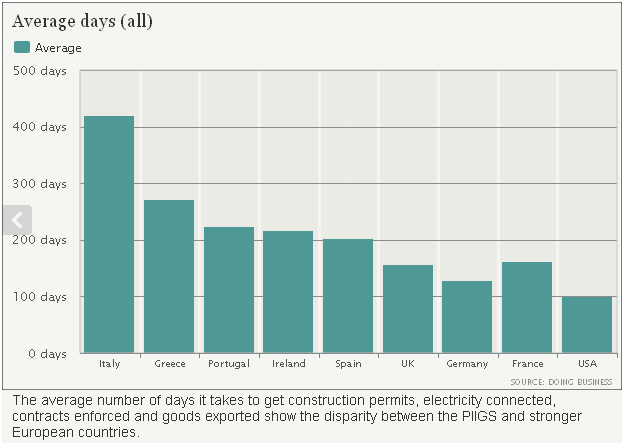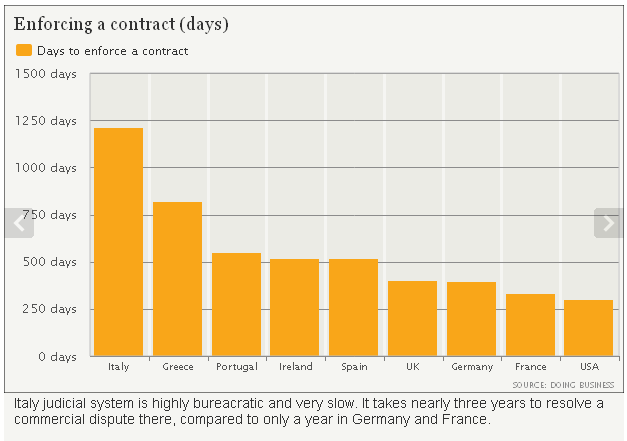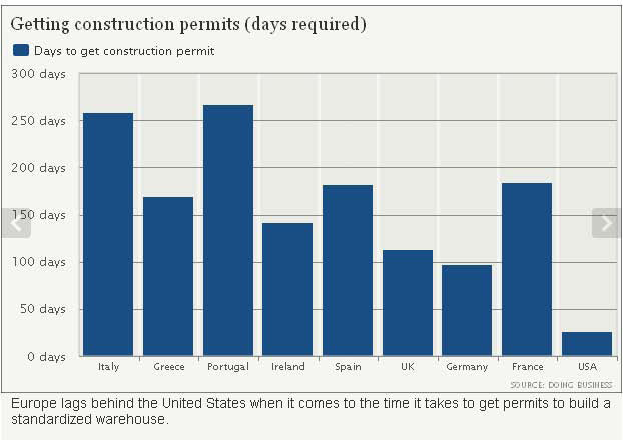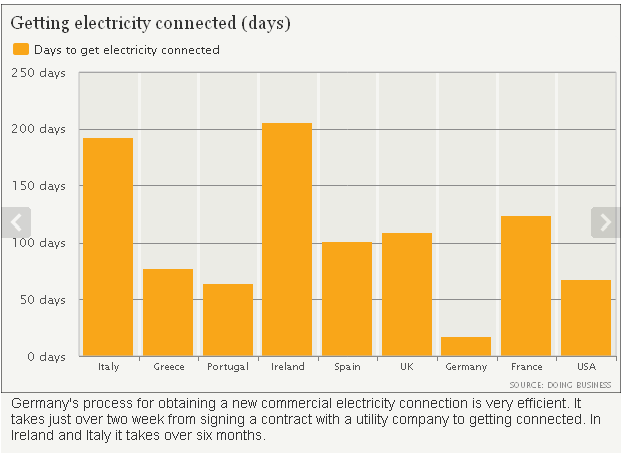In addition to decades of overspending beyond means, there are also some less discussed contributory factors leading to the current debt crisis in the Euro Zone, particularly when compared to the United States.
The following charts from the Telegraph illustrate how regulations and poor administration have held back Portugal, Ireland, Italy, Greece and Spain's economies, using data from the Doing Business project, which carried out by the World Bank, measures the time and cost of common business activities.
The charts compare eight European Union (EU) countries (Italy, Greece, Portugal, UK, Germany, France, Ireland, Spain) and the United States, in terms of days it takes to
get construction permits,
get commercial electricity connected,
enforce commercial contracts
export goods
Overall, the United States leads with an average of 100 days to carry out business in the above categories whereas it take 420 days in Italy. (See Graph Below)

One glaring example is contract enforcement.
Contracting is an essential and integral part of transacting business and contributing to a country's economic growth. Enforcing a contract takes about 9 months, which is not that great, yet it takes more than two years to enforce a contract in Greece, and more than three years in Italy.

One interesting statistics is that the U.S. leads the pact in getting construction permit in less than a month, which probably partly explained the housing bubble. The same process takes more than 8 months in Italy and Portugal to get a construction permit.

Another example is that while it takes 17 days to get commercial electricity connected in Germany, and more than two months in the US (which is bad enough), the same task takes over six months in Ireland and Italy.

Exporting and importing a standardized cargo of goods by ocean transport also takes longer in Italy, Portugal and Greece compared to other European countries as well as the the U.S. Telegraph also pointed out that it takes nearly three years to resolve a commercial dispute, compared to a year in Germany and France due to Italy's highly bureaucratic judicial system,.
From a business perspective, this suggests even if Europe could get past this current debt crisis, their recovery would be a long and difficult one with more structural reforms on the way not limited to just austerity measure.
Similar to the Euro Zone, the U.S. has its own fiscal problems with more than $15 trillion in debt, and we'd agree that there are plenty of bureaucratic red tapes in the current U.S. regulatory system. However, given the same set of global macroeconomics, our bet is that the U.S. would come out ahead in the recovery phase of the current cycle, based on its more efficient business infrastructure already in place.
The following charts from the Telegraph illustrate how regulations and poor administration have held back Portugal, Ireland, Italy, Greece and Spain's economies, using data from the Doing Business project, which carried out by the World Bank, measures the time and cost of common business activities.
The charts compare eight European Union (EU) countries (Italy, Greece, Portugal, UK, Germany, France, Ireland, Spain) and the United States, in terms of days it takes to
get construction permits,
get commercial electricity connected,
enforce commercial contracts
export goods
Overall, the United States leads with an average of 100 days to carry out business in the above categories whereas it take 420 days in Italy. (See Graph Below)

One glaring example is contract enforcement.
Contracting is an essential and integral part of transacting business and contributing to a country's economic growth. Enforcing a contract takes about 9 months, which is not that great, yet it takes more than two years to enforce a contract in Greece, and more than three years in Italy.

One interesting statistics is that the U.S. leads the pact in getting construction permit in less than a month, which probably partly explained the housing bubble. The same process takes more than 8 months in Italy and Portugal to get a construction permit.

Another example is that while it takes 17 days to get commercial electricity connected in Germany, and more than two months in the US (which is bad enough), the same task takes over six months in Ireland and Italy.

Exporting and importing a standardized cargo of goods by ocean transport also takes longer in Italy, Portugal and Greece compared to other European countries as well as the the U.S. Telegraph also pointed out that it takes nearly three years to resolve a commercial dispute, compared to a year in Germany and France due to Italy's highly bureaucratic judicial system,.
From a business perspective, this suggests even if Europe could get past this current debt crisis, their recovery would be a long and difficult one with more structural reforms on the way not limited to just austerity measure.
Similar to the Euro Zone, the U.S. has its own fiscal problems with more than $15 trillion in debt, and we'd agree that there are plenty of bureaucratic red tapes in the current U.S. regulatory system. However, given the same set of global macroeconomics, our bet is that the U.S. would come out ahead in the recovery phase of the current cycle, based on its more efficient business infrastructure already in place.
